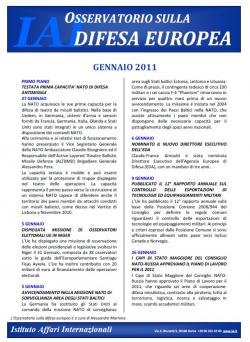Observatory on European defence, December 2000

11 December 2000
Nice European Council - ESDP
The Nice European Council adopted the French Presidency Report on the European Security and Defence Policy and its annexes (including the Force Catalogue approved on 20 November by Defence Ministers).
The “ad interim” structures have become permanent; in particular:
- the Political and Security Committee (PSC), in charge of the strategic direction and control of EU operation, implementing the decisions taken by the institution governing it (the COREPER, the General Affairs Council, the High Representative), and crisis management
- the Military Committee, formed by the Chiefs of Defence Staffs of member countries or their representatives, organism providing advice to the PSC and leading the Military Staff
- the Military Staff, military technical structure responding to the Military Committee with regard to operational capability and strategic planning; it is also an early warning and consulting structure for EU institutions.
The Council also drafted an agreement to set up permanent exchanges between EU and NATO structures to all levels and in particular in the event of crisis; these proposals, together with those on access to the Atlantic Alliance’ capabilities and the inclusion of non-EU member in EU operations, should be discussed further by the Atlantic Committee. Even if the qualified majority voting procedures have not been adopted for ESDP, the Nice Council has certainly given a positive impulse to development of the Union’s defence policy.
The main success concerns the adoption of permanent structures, thus clarifying the command structure and the strategic planning of the military capability. Nevertheless, there are still some doubts on relations between high level actors (the High Representative, the COREPER, the General Affairs Council, the EU Commission).
The relations with non-EU countries are still to be defined and some proposals by the EU will have to be deliberated by NATO.
The proposal on permanent consultation with the Alliance seems suitable, while the problem of the EU’s use of NATO assets (presumption of availability of pre-identified capabilities) will require a difficult compromise.
The Swedish Presidency of the Union will have to follow and facilitate the evolution of the ESDP, also with respect to the Atlantic Alliance.
14 – 15 December 2000
NATO Defence Ministers Meeting - NATO - ESDP Relations
The Atlantic Committee discussed the recent development of the ESDP and the documents adopted by the Nice European Council.
Agreements on reciprocal consultation and cooperation between NATO and ESDP institutions were reached (regular meetings and mutual participation in the meetings of the partner’s institutions).
Previously, the Atlantic Alliance has discussed the possible role of the Deputy SACEUR (Supreme Allied Commander Europe) in leading EU operations; this proposal was rejected by France, which would like to see the European force more autonomous from NATO.
An agreement on the EU’s permanent access to NATO assets was not reached, mainly because of opposition from Turkey, which prefers a “case by case” decision by the Alliance.
The divergence between the French-Belgian approach, aimed at guaranteeing the European force a strong strategic planning autonomy, and that of other NATO members, in particular the United Kingdom and the USA, more willing to ensure permanent access to NATO assets without duplicating the structure of the Alliance, made it impossible to reach an agreement on capabilities.
The situation is made more complex by the Turkish position, openly against permanent access to NATO assets, since the participation of non-EU countries in the Union decision-making process has still not been defined.
There has been a positive evolution in the field of institutional arrangements between security structures; channels of communication and cooperation have been established at high political and military level.The solution of the problems that emerged was postponed to the next meetings.
-
Details
Roma, Istituto affari internazionali, 2000 -
Issue
00/12


